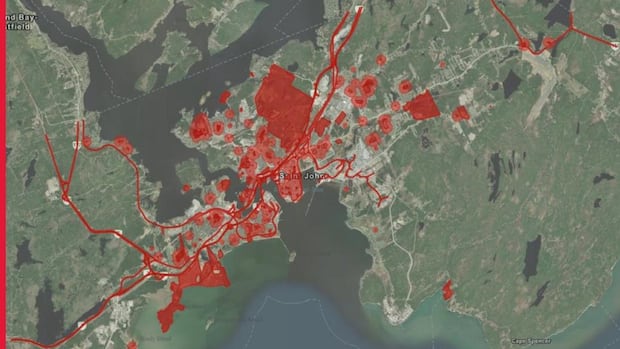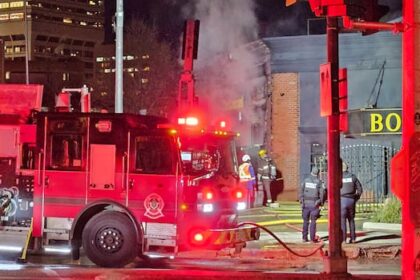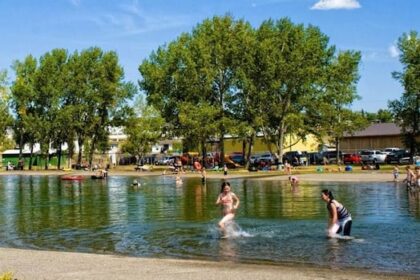New BrunswickSaint John is moving forward with its plan to prohibit encampments in several areas in the city.Ban will be implemented with a case-by-case approachNipun Tiwari · CBC News · Posted: Sep 23, 2025 7:18 AM EDT | Last Updated: 2 hours agoRed zones are areas where homeless encampments would be prohibited in Saint John, after Monday’s city council vote. (City of Saint John)Saint John city council will be moving forward with a revised version of its plan to remove homeless encampments from parts of the city after facing community backlash.Councillors voted in favour of the policy framework for the strategy — which will create encampment “red zones” — at Monday night’s council meeting. The revisions will aim to relocate encampment residents using a phased case-by-case approach depending on the needs of those living in encampments. It will also see another 27-unit transition housing “green zone” site open a month earlier than planned, in the beginning of November. It will be similar to one which opened in August.”Many unhoused individuals in red zones have been in their tents or structures for months in some cases, and years in others,” the report says. The approved plan allows the city more “flexibility in the timing of relocation on a case-by-case basis depending on the exact situation of each individual.” The report says the changes are due to many of the city’s homeless struggling with various conditions, like mobility challenges or other needs that require support from agencies in the city core or the hospital. City staff first brought its red zone plan before councillors on Sept. 8, when council approved the plan’s first steps. But that approval was met with quick backlash, notably from the Fresh Start Services non-profit group, who are slated to help implement the plan. Council also approved funding to expand Fresh Start Service’s outreach team at that same meeting so the local non-profit could help implement the red zones.Fresh Start Services Melanie Vautour originally rejected the red zone plan when it was brought to council. She said Monday night that city staff have met with the non-profit and the two sides have had thoughtful discussions. (Nipun Tiwari/CBC)Melanie Vautour, the group’s executive director, spoke out after the plan’s first phases were approved on Sept. 8. She said the red zones banned encampments in much of the city’s core where most support services are located and pushed tents into other areas — such as neighbourhoods. In a Sept. 10 interview Vautour said Fresh Start would not assist in implementing the plan in that form. Speaking with reporters after Monday’s meeting, Voutour said city staff met with her non-profit in the weeks that followed and conversations are continuing. “[City staff] have been thoughtful. They’ve met with us. We’ve had some really good discussions on moving forward,” she said.The map indicating red zone areas remains largely unchanged, but Vautour says the non-profit is looking for ways to bring services outside of the city centre. Vautour says there are a “fair number of individuals” who aren’t in the city’s uptown and that spreading resources further could offer them more opportunities.”We know we have many individuals that would prefer to not be uptown and we’re really working with the province and the city on seeing how we can get services available outside of that uptown core,” Vautour said. The city’s original goal was to have no tents in red zones by Oct. 31, but that timeline has been moved to mid-November. The city will also allow flexibility on “not requiring a relocation” if someone is tenting near the edge of a red zone if their tent poses minimal risk to the public. Red zones are a part of the city’s Housing For All strategy launched in July 2024, which aims to reduce the number of homeless and encampments visible in the city. The transition housing green zones are part of the same strategy.Also part of the plan are “yellow zones,” which are areas in the city which are neither red or green zones, where encampments would be permitted. Recent numbers by the Human Development Council non-profit says that there were 218 chronically homeless in Saint John in August.Mayor says tents will not be torn downWhile the final plan received positive response from Vautour and council, dozens of residents held a demonstration protesting both the red zone plan and even more so, a separate motion to remove encampments from the city entirely by Coun. Greg Norton.”During the [Sept. 8] council meeting, the terms ‘human rights’ and ‘humanistic approach’ must have been thrown around over 50 times,” said one resident, Hannah Duguay, speaking to those who attended. “If you’re adhering to basic human rights, you don’t need to clarify that…. Displacing someone from where they live and redlining them to the outskirts of town with no access to basic needs and amenities is inhumane.”Hannah Duguay, speaking at the mic Monday, is one of a handful of residents who protested in front of city hall, taking aim at both the city red zone plan and Greg Norton’s motion to remove all encampments from the city. (Nipun Tiwari/CBC)Mayor Donna Reardon emphasized the city will not be physically removing tents. “Fresh Start is going to go in and they’re going to talk to people and tell them what we’d like to do,” Reardon said.”If we don’t get compliance after they’ve talked to them a few times, then we’ll just figure out what we’re going to do next. But we’re not sending people to just tear down tents.”Saint John Mayor Donna Reardon says that the city will not be physically tearing down encampments and that the yellow zones part of the plan will allow the city to provide amenities because they will be on city-owned land. (Nipun Tiwari/CBC)Reardon also says the yellow zones offer potential because they would be on city-owned property.”So we can provide amenities. But we can’t provide amenities on someone else’s property,” Reardon said. “A lot of the encampments are on [provincial] property.”In a Sept. 17 interview, police Chief Robert Bruce said the force would not be removing tents to enforce red zones.Full encampment ban rejectedCoun. Norton’s notice of motion to remove encampments from city lands also came before council Monday and was rejected by nearly all councillors — a decision met with applause from some in the audience.Saint John Coun. Greg Norton introduced a notice of motion to council to remove all encampments from city land at the Sept. 8 council meeting. His motion was voted down by other councillors Monday night. (Nipun Tiwari/CBC)The plan to remove encampments entirely within two weeks after a potential approval was also first introduced on Sept 8. Facing questions from other councillors, Norton says the Housing For All strategy has made no substantive changes to the city’s homelessness issue. He said the city needs a hard stance which, he said, could be taken with compassion and would not aim to prosecute the homeless community. “Council had two choices; to eradicate the problem in 14 days,” he said, speaking with reporters after the vote.”Or continue to kick the ball down the field and we’ll be back next year where this problem continues to persist.”Norton says issues stemming from homelessness are discouraging to both investors and homeowners “in the taxpaying public” who are trying to use public spaces.Coun. Gary Sullivan voted against Norton’s motion but also said that he understands where it’s coming from and won’t completely discount it. “I’m willing to give [the Housing for All strategy] we voted for as council a chance,” Sullivan said.”It’s not to say, in a month’s time, if it doesn’t look like it’s working, I’m not ready to pivot quickly.”Coun. Gerry Lowe seconded the motion.While critical of the council decision, Norton says “the will of council stands and I respect that.”ABOUT THE AUTHORNipun Tiwari is a reporter assigned to community engagement and based in Saint John, New Brunswick. He can be reached at nipun.tiwari@cbc.ca.With files from Information Morning Saint John
Saint John plan to ban encampment in some areas gets final approval, with changes











